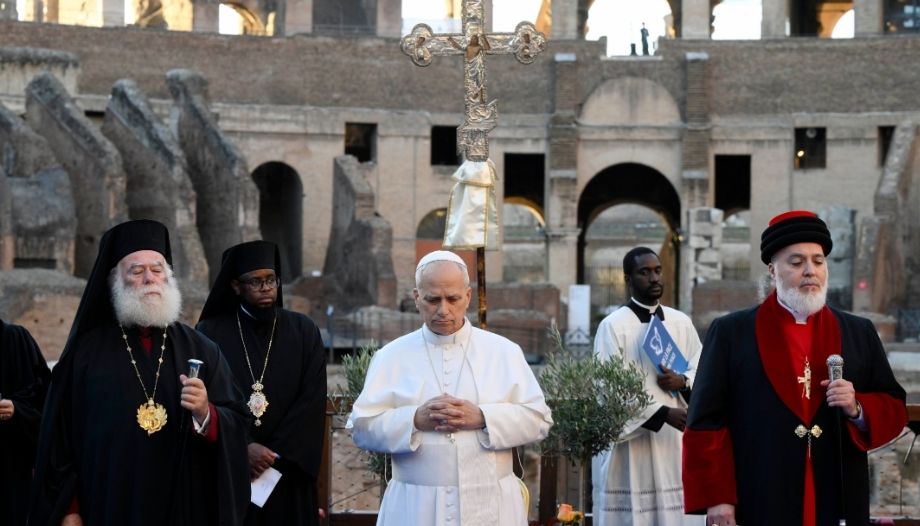On the 60th anniversary of the declaration ‘Nostra Aetate’ (In Our Time), a declaration of the Second Vatican Council of just two pages, signed by St. Paul VI, Pope Leo XIV has invited all religions to work “together”.
Sixty years ago, on October 28, 1965, the Second Vatican Council, with the promulgation of the Statement ‘Nostra aetate’, “opened a new horizon of encounter, respect and spiritual hospitality,” the Pontiff said, referring to interreligious dialogue.
“This luminous document teaches us to encounter the followers of other religions not as strangers, but as fellow travelers on the path of truth. To honor differences by affirming our common humanity. And to discern, in every sincere religious quest, a reflection of the one divine Mystery that embraces all creation.”.
Jesus' dialogue with the Samaritan woman
The Pope had begun the reflection of his catechesis, dedicated to interreligious dialogue, with «the dialogue of the Lord Jesus with the Samaritan woman: ‘God is spirit, and those who worship him must worship him in spirit and in truth’”.
“The essence of authentic interreligious dialogue is people opening up and listening to each other with sincerity. This dialogue is born of God's thirst for the human heart and humanity's thirst for God.»
Spirit of friendship and collaboration
“Dear brothers and sisters, sixty years after Nostra Aetate, let us act together! Let us pass on the spirit of friendship and collaboration among religions to the future generation, because it is the true pillar of dialogue,” the Pope added.
A message which he has been transmitting to pilgrims of different languages, as he usually does.
Alleviating human suffering and caring for creation
For example, to Spanish-speaking people, he said: “Let us pray to the Lord that all religious traditions may contribute to alleviating human suffering and caring for creation. We know that prayer has the power to transform our attitudes, our thoughts, our words and our actions”.
Shortly after, recalling that «the first orientation of ‘Nostra aetate’ was towards the Jewish world, with which St. John XXIII wanted to re-establish the original relationship,” he addressed the English-speaking pilgrims.
A new world without divisions
“The world needs more than ever the powerful witness of men and women of all religions living together in unity, friendship and cooperation.”.
“In this way, we can work together to achieve the peace, justice and reconciliation that are so urgently needed today. May we therefore never lose hope that a new world without divisions is possible.”.
The Church does not tolerate anti-Semitism and fights it.
In deepening relations with the Jewish people, the Holy Father stressed that the Church, “conscious of the heritage she has in common with the Jews, and moved not by political motives but by evangelical religious charity, deplores hatred, persecution and all manifestations of anti-Semitism of any time and person against the Jews.”.
Since then, he continued, “all my predecessors have condemned anti-Semitism with clear words. And, therefore, I also confirm that the Church does not tolerate anti-Semitism and fights it, by virtue of the Gospel itself”.
“Today we can look with gratitude at all that has been achieved in the Jewish-Catholic dialogue in these six decades. This is due not only to human effort, but to the assistance of our God who, according to Christian conviction, is himself dialogue.”.
There have been misunderstandings and difficulties, but always dialogue.
The Pontiff acknowledged that in this period there have also been “misunderstandings, difficulties and conflicts”, but these have never prevented the continuation of the dialogue.
“Nor today should we allow political circumstances and the injustices of some to keep us away from friendship, especially since we have achieved so much so far.”.
Hope to the world
In concluding, the Successor of Peter said that “sixty years ago, ‘Nostra Aetate’ brought hope to the world emerging from the Second World War.
Today, we are called to rebuild that hope in our war-torn world and in our degraded natural environment. Let us work together, because if we are united, everything is possible. Let us ensure that nothing divides us,” he reaffirmed.
In German, recitation of the Holy Rosary
To the German-speaking pilgrims, and to a St. Peter's Square and adjacent streets filled with the faithful, the Pope said: “Dear German-speaking pilgrims, at the end of this month dedicated to Our Lady of the Rosary, I invite you to remain faithful to this beautiful prayer to the Mother of God, who is also our Mother: ‘May we, with her divine Son, bless the Virgin Mary’”.








